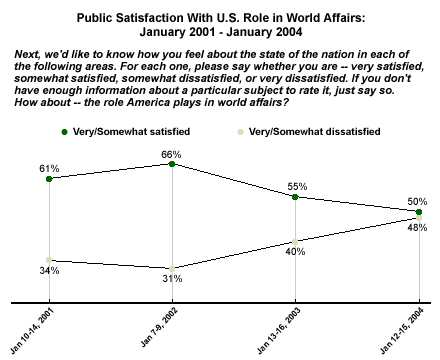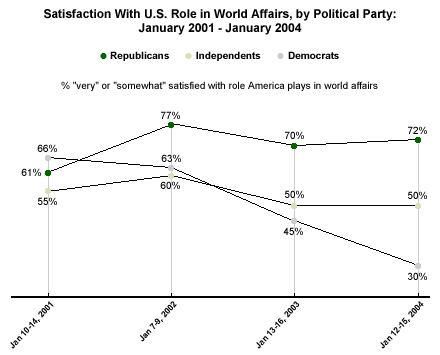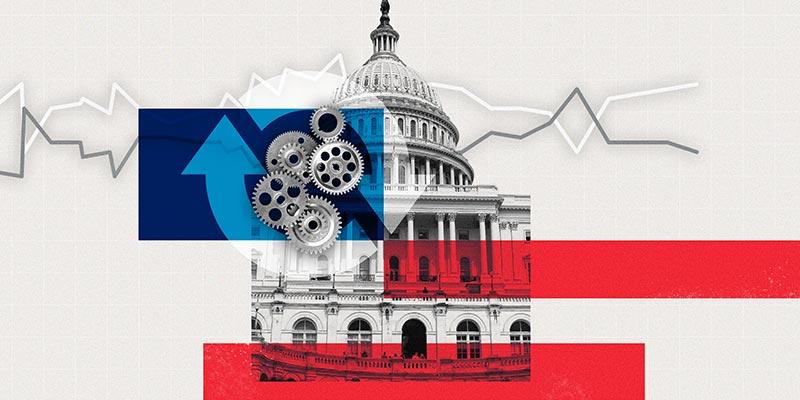Following the end of the Cold War and a decade of relative calm, Americans have endured nearly three years of tumultuous international relations. The terrifying September 2001 terrorist attacks, the invasion of Afghanistan, the buildup to the Iraq war, and the subsequent attack and rebuilding of Iraq -- overall, a dizzying array of events that has clearly taken a toll on the American psyche.
Gallup’s annual Mood of the Nation poll* asks Americans to rate their satisfaction with a series of aspects of life in the United States, including "the role America plays in world affairs." 优蜜传媒has asked this question four times in the past three years, and responses have seesawed significantly during that period. The results illustrate Americans’ wide range of feelings and opinions about their country in the post-9/11 world.
In January 2001, just before President George W. Bush took office and eight months before Sept. 11, 61% of Americans were either "very" or "somewhat" satisfied with the United States’ role in world affairs. In the wake of the post-9/11 rally in government support, that percentage increased slightly to 66%, then dropped to 55% in January 2003, during the buildup to the war in Iraq. As the recent Jan. 12-15 poll shows, just half (50%) of Americans are very or somewhat satisfied with the country’s role in world affairs, while 48% are dissatisfied (including 21% who are very dissatisfied).

Partisan Differences
As a whole, public satisfaction with America’s role on the world stage has dropped 11 percentage points since January 2001. But a look at the historical results by political party shows a far more dramatic shift.
In January 2001, when the eight-year administration of Democratic President Bill Clinton was ending, two-thirds of Democrats (66%) were very or somewhat satisfied with America’s role in world affairs, as were nearly as many Republicans (61%), and 55% of independents. In January 2002, four months after Sept. 11, Democratic satisfaction was holding relatively steady at 63% and Republican satisfaction had jumped to 77%. Sixty percent of independents were satisfied, a slightly higher proportion than the year before.
But the results in January 2003 painted quite a different picture. Democratic dissatisfaction with the Bush administration’s foreign policy was beginning to show, as less than half of Democrats (45%) were satisfied with the United States’ role in world affairs. Republicans’ satisfaction dropped as well -- but only slightly, to 70%. Half of independents (50%) were satisfied with America’s role in January 2003.
The current survey shows Democratic satisfaction dropping once again, to 30%, while Republicans’ and independents’ levels of satisfaction have shown little or no change when compared with last year (72% among Republicans, 50% among independents). The percentages of "very satisfied" responses show an even stronger divergence -- 28% of Republicans say they are very satisfied with America’s role, compared with only 6% of Democrats and 15% of independents.

Bottom Line
When Bush took office three years ago, no one could have predicted where the United States would be today, and it is impossible to predict where it will be nine months from now at the time of the 2004 election. But it is clear that Americans are currently deeply divided on the appropriate role and responsibilities of the United States in relation to the global community, and this divergence will likely color much of the discussion before the 2004 election.
*Results are based on telephone interviews with 1,004 national adults, aged 18 and older, conducted Jan. 12-15, 2004. For results based on the total sample of national adults, one can say with 95% confidence that the maximum margin of sampling error is ±3 percentage points.
